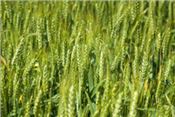UK Winter Wheat Meeting Changed To Feb. 8

The Winter Wheat Meeting will allow producers to interact with members of the UK Wheat Science Group and industry representatives.
Photo by Steve Patton, UK agricultural communications.
KATIE PRATT
LEXINGTON, KENTUCKY
The University of Kentucky Wheat Science Group has moved its annual Winter Wheat Meeting to 9 a.m.-3 p.m. CST Feb. 8 at the Bruce Convention Center in Hopkinsville.
The date change allows more time for producers and UK specialists to recover from the Dec. 10 tornado that devastated much of Western Kentucky.
The meeting will feature presentations from UK College of Agriculture, Food and Environment specialists and Karen Meinders, Corteva Agrisciences’ global research and development and sustainability communications leader. She will speak about ways producers can effectively talk about sustainability practices on their farms with stakeholders and consumers.
“Kentucky farmers have a great story to tell when it comes to sustainability,” said Travis Legleiter, UK weeds scientist. “We are excited to have Karen speak with the group about ways farmers can expand their communications efforts.”
UK agricultural economist Jordan Shockley will lead a discussion on ways producers can successfully manage high input costs and capitalize on market prices.
“Given the volatility of both input and crop prices, it’s important to use all the economic tools available to you going into 2022,” he said.
Additional UK presentations include lessons from the UK wheat yield contest, soil sampling for precision agriculture, and nitrogen, sulfur and micronutrient interactions in wheat nutrition.
“The wheat yield contest tells us what yields are possible in Kentucky,” said Chad Lee, director of the UK Grain and Forage Center of Excellence, who will lead that discussion. “We will discuss the practices that contest winning farmers used to achieve those results.”
The program is approved for continuing education units for Certified Crop Advisors. They can receive one hour each in soil and water management and integrated pest management and 0.5 hours each in nutrient management, crop management and sustainability. Pesticide applicators can receive one general and one specific hour of continuing education in categories 1A and 10. ∆
KATIE PRATT: University of Kentucky